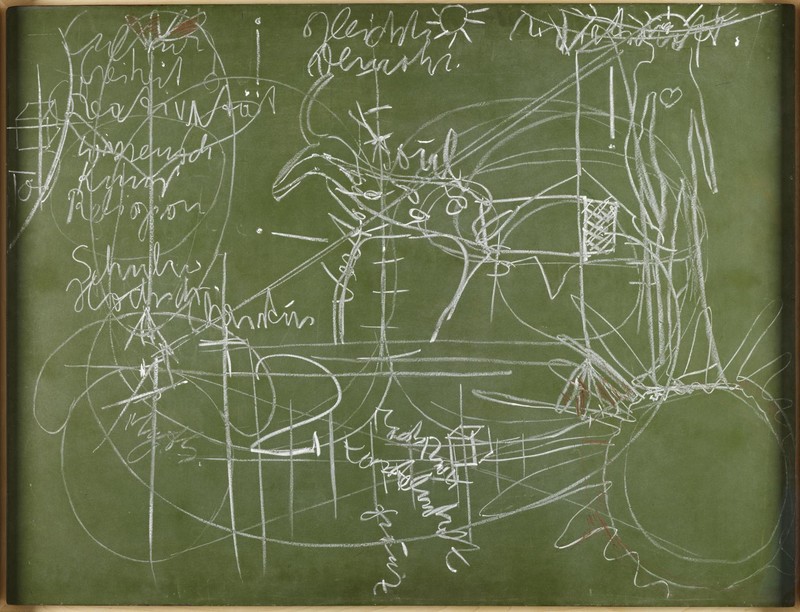Joseph Beuys
23 Nov 2015 - 31 Dec 2016

Joseph Beuys
For the lecture: The social organism - a work of art, Bochum, 2nd March 1974 1974
White and brown chalk on blackboard
support: 1000 x 1300 x 20 mm
ARTIST ROOMS
Acquired jointly with the National Galleries of Scotland through The d'Offay Donation with assistance from the National Heritage Memorial Fund and the Art Fund 2008© DACS, 2009
For the lecture: The social organism - a work of art, Bochum, 2nd March 1974 1974
White and brown chalk on blackboard
support: 1000 x 1300 x 20 mm
ARTIST ROOMS
Acquired jointly with the National Galleries of Scotland through The d'Offay Donation with assistance from the National Heritage Memorial Fund and the Art Fund 2008© DACS, 2009
German artist Joseph Beuys saw creativity as central to all aspects of human existence. As well as sculpture and performance, his work as an artist came to encompass social theory and political action.
Beuys’s activities became explicitly politicised in the 1970s. A series of confrontations with the Academy of Art in Düsseldorf over the number of students that he could admit to his class led to wider questions about accessibility to education and the relationship between ordinary people and authority. In 1971 he founded a Free Academy and the more overtly political Organisation for Direct Democracy through Referendum. Beuys argued that social decision-making should be made by the people through referendums rather than elected political parties. It was this concept of ‘direct democracy’ that he explored in his Information Action at the Tate in 1972, from which three of the blackboards shown here are taken. Later he became involved in the German Green Party and organised the planting of 7000 oak trees around the city of Kassel.
In 1982, Beuys took part in an exhibition in Berlin, where he installed a huge mound of clay and surrounded it with sculptures as well as furniture and tools from his studio. Afterwards he made casts of some of the elements to create Lightning with Stag in its Glare 1958-85. The bolt of lightning itself was a bronze cast from a section of the clay mound, while the stag was cast in aluminium as if illuminated by a sudden flash of light. Made towards the end of Beuys’s life, this major installation addresses themes of finality and death, but also ideas of regeneration and the transformative power of nature.
Curated by Matthew Gale
Beuys’s activities became explicitly politicised in the 1970s. A series of confrontations with the Academy of Art in Düsseldorf over the number of students that he could admit to his class led to wider questions about accessibility to education and the relationship between ordinary people and authority. In 1971 he founded a Free Academy and the more overtly political Organisation for Direct Democracy through Referendum. Beuys argued that social decision-making should be made by the people through referendums rather than elected political parties. It was this concept of ‘direct democracy’ that he explored in his Information Action at the Tate in 1972, from which three of the blackboards shown here are taken. Later he became involved in the German Green Party and organised the planting of 7000 oak trees around the city of Kassel.
In 1982, Beuys took part in an exhibition in Berlin, where he installed a huge mound of clay and surrounded it with sculptures as well as furniture and tools from his studio. Afterwards he made casts of some of the elements to create Lightning with Stag in its Glare 1958-85. The bolt of lightning itself was a bronze cast from a section of the clay mound, while the stag was cast in aluminium as if illuminated by a sudden flash of light. Made towards the end of Beuys’s life, this major installation addresses themes of finality and death, but also ideas of regeneration and the transformative power of nature.
Curated by Matthew Gale
